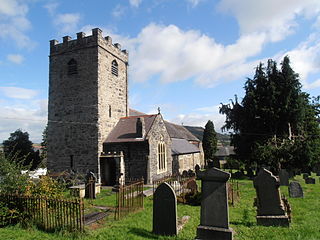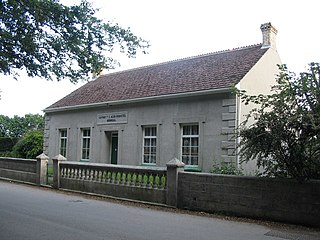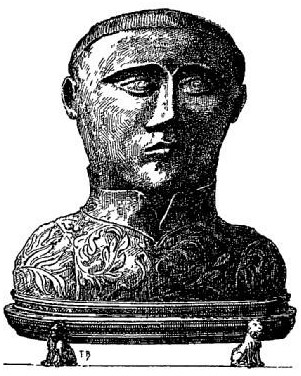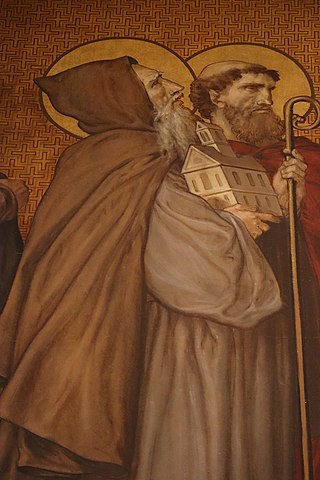Related Research Articles

Samson of Dol was a Welsh saint, who is also counted among the seven founder saints of Brittany with Pol Aurelian, Tugdual or Tudwal, Brieuc, Malo, Patern (Paternus) and Corentin. Born in southern Wales, he died in Dol-de-Bretagne, a small town in north Brittany.

Petroc or Petrock was a British prince and Christian saint.
Salomon was a late 5th century Cornish 'warrior prince', possibly a King of Cornwall. His feast day takes place on the 18 October. He was the father of the Cornish bishop Saint Cybi.

Paul Aurelian was a 6th-century Welshman who became first bishop of the See of Léon and one of the seven founder saints of Brittany. He allegedly died in 575, rumoured to have lived to the age of 140, after having been assisted in his labors by three successive coadjutors. This suggests that several Pauls have been conflated. Gilbert Hunter Doble thought that he might have been Saint Paulinus of Wales.

Brioc was a 5th-century Welsh holy man who became the first abbot of Saint-Brieuc in Brittany. He is one of the seven founder saints of Brittany.

Saint Mael and Saint Sulien's Church is a church located in the town of Corwen in Denbighshire in Wales. It was formerly located in the ancient county of Merionethshire.

Luxulyan, also spelt Luxullian or Luxulian, is a village and civil parish in mid Cornwall, England, United Kingdom. The village lies four miles (6.5 km) northeast of St Austell and six miles (10 km) south of Bodmin. The population of the parish was 1,371 in the 2001 census. This had risen to 1,381 at the 2011 census.

Saint Tysilio was a Welsh bishop, prince and scholar.

Cubert is a village in Cornwall, England, United Kingdom. It is three miles (5 km) south-southwest of Newquay and is in the civil parish of Cubert.

Winwaloe was the founder and first abbot of Landévennec Abbey, also known as the Monastery of Winwaloe. It was just south of Brest in Brittany, now part of France.
Gilbert Hunter Doble was an Anglican priest and Cornish historian and hagiographer.

Melor was a 10th-century Breton saint who, in England, was venerated in Cornwall and at Amesbury Abbey, Wiltshire, which claimed some of his relics.

Saint Carantoc, also anglicized as Carantock, Carannog and by other spellings, was a 6th-century abbot, confessor, and saint in Wales and the West Country. He is credited with founding Llangrannog, Ceredigion, Wales and St Carantoc's Church, Crantock. His name is listed amongst the Cornish Saints. Carantoc's is one of five insular saints' lives and two Breton ones that mention Arthur in contexts that may be independent of Geoffrey of Monmouth's Historia Regum Britanniae. He is venerated by the Eastern Orthodox Church and Roman Catholic Church.

Saint Budoc of Dol was a Bishop of Dol, venerated after his death as a saint in both Brittany and Devon. Saint Budoc is the patron of Plourin Ploudalmezeau in Finistère where his relics are preserved. His feast day was celebrated on 8 December, the date still used in Devon, but in Brittany this was moved to 9 December.

Austol was a 6th-century Cornish holy man who lived much of his life in Brittany.

Saint Congar, was a Welsh abbot and supposed bishop in Somerset, then in the British kingdom of Somerset, now in England.
Mewan was a Celtic saint active in Wales, Cornwall and Brittany. Most documentation of his life can be found in the Breton 'Vita Meveni', perhaps written in 1084 by Ingamar.
Saint Constantine is the name of one or many British or Pictish saints.
Saint Euny or Uny is the patron saint of the churches of Lelant and Redruth in west Cornwall, England, UK.
References
- ↑ Doble, G. H. (1970) The Saints of Cornwall: part 5. Truro: Dean and Chapter; pp. 104–126